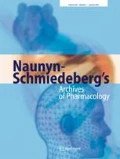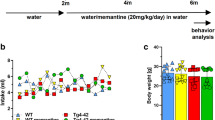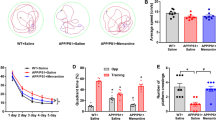Abstract
Memantine is a non-competitive N-methyl-d-aspartate receptor antagonist, which has been employed in the clinic as a neuroprotective agent for the treatment of several dementias, particularly Alzheimer’s disease. In this study, we evaluated pharmacological effects of the acute administration of memantine on memory process. Memory retention scores were evaluated in normal adult Wistar rats injected with saline and memantine (2, 5, 10, and 20 mg/kg, IP) and then subjected to the step-down inhibitory avoidance task, habitation to an open-field apparatus, and object recognition task. The treatment with higher doses of memantine (10 and 20 mg/kg) injected 60 min before or immediately after training-session impaired acquisition and retention of aversive memory in the inhibitory avoidance task. In addition, higher doses of memantine injected 60 min before the first open-field exposure also impaired habituation during the second exposure to the apparatus. No significant differences were observed in the performance of rats treated with memantine, in all doses tested, compared to saline-treated rats in the object recognition task. Notably, we observed that at 5 mg/kg, memantine increased spontaneous locomotion and exploration in the rat open-field test. In conclusion, present findings support the view that memantine at lower doses did not affect memory formation in normal rats, but at high doses memantine, induce hyperlocomotion, which could bias the interpretation of the animal behavior assessed in memory tests.



Similar content being viewed by others
References
Creeley C, Wozniak DF, Labruyere J, Taylor GT, Olney JW (2006) Low doses of memantine disrupt memory in adult rats. J Neurosci 26:3923–3932
Danysz W, Parsons CG (2003) The NMDA receptor antagonist memantine as a symptomatological and neuroprotective treatment of Alzheimer’s disease: preclinical evidence. Int J Geriatr Psychiatry 18:S23–S32
Danysz W, Essmann U, Bresink I, Wilke R (1994) Glutamate antagonists have different effects on spontaneous locomotor activity in rats. Pharmacol Biochem Behav 48(1):111–118
Dere E, Huston JP, De Souza Silva MA (2007) The pharmacology, neuroanatomy and neurogenetics of one-trial object recognition in rodents. Neurosci Biobehav Rev 31(5):673–704
Gold PE (1986) The use of avoidance training in studies of modulation of memory storage. Behav Neural Biol 46:87–98
Izquierdo I, Medina JH (1997) Memory Formation: the sequence of biochemical events in the hippocampus and its connection to activity in other brain structures. Neurobiol Learn Mem 68:285–316
Lipton SA (2004) Paradigm shift in NMDA receptor antagonist drug development: molecular mechanism of uncompetitive inhibition by memantine in treatment of Alzheimer’s disease and other neurologic disorders. J Alzheimer’s Dis 6:61–74
Lipton SA, Rosenberg PA (1994) Excitatory amino acids as a final common pathway for neurologic disorders. N Engl J Med 330(9):613–622
Minkeviciene R, Banerjee P, Tanila H (2004) Memantine improves spatial learning in a transgenic mouse model of Alzheimer’s disease. J Pharmacol Exp Ther 311:677–682
Misztal M, Danysz W (1995) Comparison of glutamate antagonists in continuous multiple-trial and single-trial dark avoidance. Behav Pharmacol 6:550–561
Misztal M, Frankiewicz T, Parsons CG, Danysz W (1996) Learning deficits induced by chronic intraventricular infusion of quinolinic acid—protection by MK-801 and memantine. Eur J Pharmacol 296:1–8
Muir KW (2006) Glutamate-based therapeutic approaches: clinical trials with NMDA antagonists. Curr Opin Pharmacol 6(1):53–60
Nakamura S, Murayama N, Noshita T, Katsuragi R, Ohno T (2006) Cognitive dysfunction induced by sequential injection of amyloid-beta and ibotenate into the bilateral hippocampus; protection by memantine and MK-801. Eur J Pharmacol 548(1–3):115–122
Olney JW (1989) Excitotoxicity and N-methyl-d-aspartate receptors. Drug Dev Res 17:299–319
Parsons CG, Danysz W, Quack G (1999) Memantine is a clinically well tolerated N-methyl-d-aspartate (NMDA) receptor antagonist—a review of preclinical data. Neuropharmacology 38:735–767
Parsons CG, Stoffler A, Danysz W (2007) Memantine: a NMDA receptor antagonist that improves memory by restoration of homeostasis in the glutamatergic system—too little activation is bad, too much is even worse. Neuropharmacology 53:699–723
Pieta Dias C, Martins de Lima MN, Presti-Torres J, Dornelles A, Garcia VA, Siciliani Scalco F, Rewsaat Guimaraes M, Constantino L, Budni P, Dal-Pizzol F, Schroder N (2007) Memantine reduces oxidative damage and enhances long-term recognition memory in aged rats. Neuroscience 146(4):1719–25
Reisberg B, Doody R, Stoffler A, Schmitt F, Ferris S, Möbius HJ (2003) Memantine in moderate-to-severe Alzheimer’s disease. N Engl J Med 348:1333–1341
Rosi S, Vazdarjanova A, Ramirez-Amaya V, Worley PF, Barnes CA, Wenk GL (2006) Memantine protects against LPS-induced neuroinflammation, restores behaviorally induced gene expression and spatial learning in the rat. Neuroscience 142(4):1303–1315
Tariot PN, Farlow MR, Grossberg GT, Graham SM, McDonald S, Gergel I (2004) Memantine treatment in patients with moderate to severe Alzheimer disease already receiving donepezil: a randomized controlled trial. JAMA 291:317–324
Vianna MR, Alonso M, Violo H, Quevedo J, De-Paris F, Furman M, de Stein ML, Medina JH, Izquierdo I (2000) Role of hippocampal signaling pathways in long-term memory formation of nonassociative learning task in the rat. Learn Mem 7:333–340
Yamada K, Takayanagi M, Kamei H, Nagai T, Dohniwa M, Kobayashi K, Yoshida S, Ohhara T, Takuma K, Nabeshima T (2005) Effects of memantine and donepezil on amyloid beta-induced memory impairment in a delayed-matching to position task in rats. Behav Brain Res 162(2):191–199
Zajaczkowski W, Quack G, Danysz W (1996) Infusion of (+)-MK-801 and memantine—contrasting effects on radial maze learning in rats with entorhinal cortex lesion. Eur J Pharmacol 296:239–246
Zajaczkowski W, Frankiewicz T, Parsons CG, Danysz W (1997) Uncompetitive NMDA receptor antagonists attenuate NMDA-induced impairment of passive avoidance learning and LTP. Neuropharmacology 36:961–971
Zoladz PR, Campbell AM, Park CR, Schaefer D, Danysz W, Diamond DM (2006) Enhancement of long-term spatial memory in adult rats by the noncompetitive NMDA receptor antagonists, memantine and neramexane. Pharmacol Biochem Behav 85(2):298–306
Acknowledgment
This research was supported by grants from CNPq, FAPESC, and UNESC (Brazil).
Author information
Authors and Affiliations
Corresponding author
Rights and permissions
About this article
Cite this article
Réus, G.Z., Valvassori, S.S., Machado, R.A. et al. Acute treatment with low doses of memantine does not impair aversive, non-associative and recognition memory in rats. Naunyn-Schmied Arch Pharmacol 376, 295–300 (2008). https://doi.org/10.1007/s00210-007-0235-x
Received:
Accepted:
Published:
Issue Date:
DOI: https://doi.org/10.1007/s00210-007-0235-x




